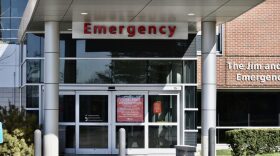When doctors in this country work with patients originally from other countries, it can feel like a bit of a telephone game. This feeling is compounded when there’s a translator in the room passing messages back and forth.
TheManchester Community Health Center has always offered primary health and support services to low-income Manchester residents. But a new pilot project tries to address the problems created by the telephone game by enlisting community health workers to make house calls for patients with chronic diseases who face cultural barriers to accessing the care that they need.
When you’re not feeling well, you want to feel better as quickly as possible. For that reason, interactions with medical professionals can be stressful, and that’s when you both speak the same language. Imagine what it’s like for someone still learning to speak the language.
Jazmin Miranda, a community health worker, and provides translation services to Spanish speaking patients, explains that she is more than a simple conduit between doctor and patient. “Once the individuals go home how do they implement what they were asked to do. Even the language we use like “you need to have a good lifestyle” when you translate that into Spanish or Arabic some of the things don’t have a real translation that has meaning.”
That’s why as a part of the pilot program with MCHC she follows up these office visits with home visits. “The idea is to really assess the whole life of the individual. But we’re trying to not only do it in the language that they speak, but really understand culturally.”
“A healthy diet for an American is very different than for a Puerto Rican person or Columbian person, because foods and habits are different , same with Arabic people. We need to make sure that the foods that they are using are really going to help them with their help. If we ask them to exercise, are there places where they can get out and walk in a safe way? Do they have sidewalks?”
Cesarina Restituyo is one of her patients. Originally from the Dominican Republic, she’s been grappling with diabetes. “My blood sugar was in the 400-500 range, it was very high and I even ended up in the hospital,” she says through Miranda’s translation. “Jazmin has come into my house and helped me a lot,” Restituyo continues. “She gives me advice about what to eat, she checks with me about my blood sugar levels and how they’re going down.”
Restituyo is an example of how MCHC’s pilot program is making a difference. “I’m getting better,” she says, “because they’ve helped me with my food and how to eat and take my medications at the right time. They’ve helped me a lot.” And she’s feeling much better now.







